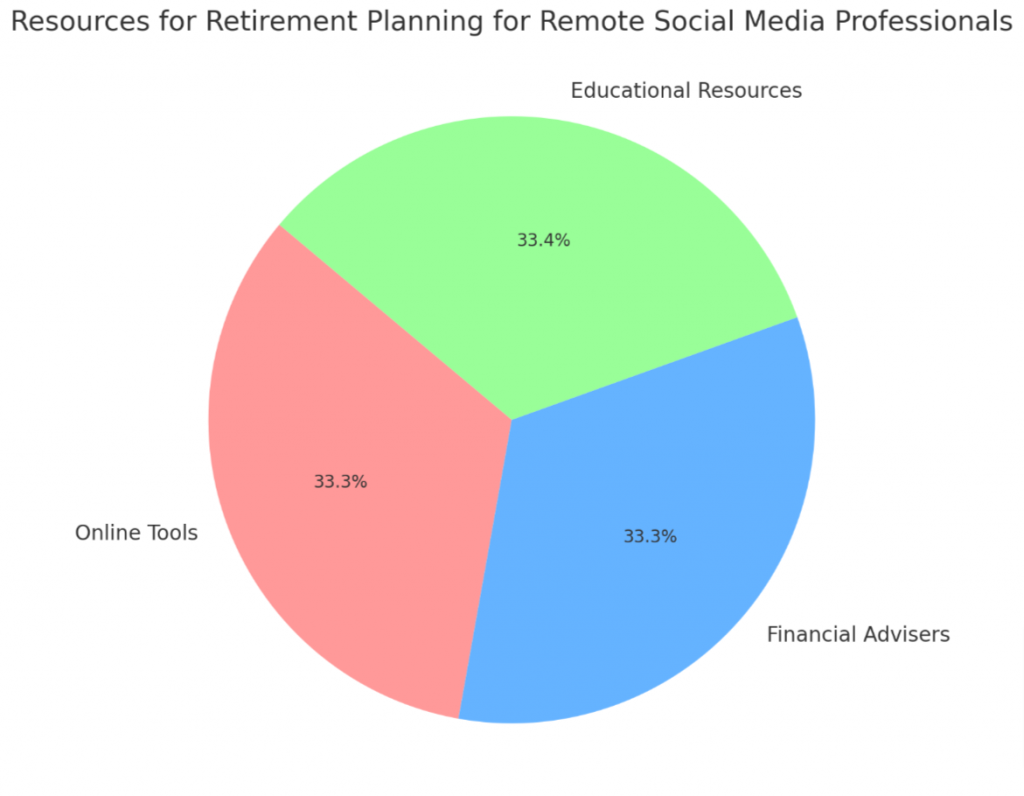Future-Proofing Your Career: Retirement Strategies for Remote Social Media Professionals
Are you a remote social media professional worried about your retirement plan? According to a Value Penguin study, 63% of Americans are perplexed by the concept of a 401(k) retirement plan.
This article will provide actionable steps for successfully planning your golden years, even in an unconventional field like social media. Read on and discover how to convert your online expertise into long-term financial security!
Key Takeaways
- Remote social media professionals face unique challenges in retirement planning, such as lack of access to employer-sponsored plans and fluctuating income.
- Understanding retirement needs and setting clear goals are essential for successful retirement planning.
- Utilizing online tools, financial advisers, and educational resources can help remote social media professionals effectively plan for their future.
The Challenges of Retirement Planning for Remote Social Media Professionals
Navigating the path to retirement poses unique challenges for remote social media professionals. Unlike traditional employees, they often work as independent contractors, lacking access to employer-sponsored 401(k) plans that provide a stable source of income in later years.
They also have an increased potential of falling into “get rich quick” traps promoted via social media networks – schemes that ultimately undermine long-term savings efforts.
Additionally, financial decisions can become complex without face-to-face guidance from financial advisors or HR departments. The COVID pandemic has amplified these difficulties with limited access to seminars and other educational resources.
Remote workers need advanced communication tools like Zoom and Slack not just for their daily tasks but also for financial discussions regarding their future needs. To further compound matters, fluctuating influencer earnings and irregular payment schedules make it harder to set clear retirement goals and maintain regular savings habits.
Importance of Retirement Planning
Retirement planning stands as a vital pillar for secure future living. It’s not just about setting aside a portion of your income for old age, it goes beyond that to encompass smart financial management and investment decisions.
According to Keith Huber, retirement plan advisor at OneDigital, being aware of where your money is going plays a significant role in determining how much you’ll need for retirement.
Unexpected expenses can arise at any time during the golden years. Thus, it becomes essential to create a robust retirement plan that provides an annuity product or stable source of income.
Notably, as revealed by recent findings, almost 40% of people are turning towards their social media networks seeking advice on finance and retirement. This illustrates the growing influence these platforms have on individual’s life plans.
While social media can sometimes paint an overly rosy picture with “get rich quick” schemes promising effortless long-term savings, one should remember actual financial security comes through consistent saving and wise investments over time.
Therefore, neither the siren call of instant riches nor the apathy of confusion should deter remote social media professionals from taking charge of their own futures through effective retirement planning.
How Remote Social Media Professionals Can Plan for Retirement
Remote social media professionals can effectively plan for retirement by understanding their retirement needs and setting clear goals. By utilizing online tools, financial advisers, and educational resources, they can take proactive steps towards a successful retirement.
Read on to discover valuable tips and strategies for remote social media professionals in planning for their future.
Understanding Retirement Needs
To effectively plan for retirement as a remote social media professional, it’s key to understand your unique financial needs. This understanding stems from an assessment of your current lifestyle and the desired standard you wish to maintain post-retirement.
Factoring in considerations like inflation and healthcare costs, which often rise over time, is vital. Disturbingly, 63% of Americans are unclear about the basics of a 401k plan – a common avenue for retirement savings.
Moreover, almost 40% now resort to social media networks seeking advice on retirement and finance—this can be misleading due to ‘get-rich-quick’ schemes that make long-term saving strategies seem less appealing or unnecessary.
Setting Clear Retirement Goals
Clear retirement goals act as a roadmap guiding you towards a stable financial future. For instance, Keith Huber, an advisor at OneDigital, emphasizes scrutinizing current and future expenditures to draft personalized retirement plans.
This isn’t merely about meeting living expenses post-retirement but also including lifestyle desires such as pursuing hobbies or traveling. With 40% of individuals seeking financial advice on social media platforms, it’s crucial to remain cautious of misleading ‘get-rich-quick’ schemes that may derail long-term savings plans.
Resources and Tools for Retirement Planning
Discover the online retirement planning tools, financial advisers, and helpful financial literature that can assist remote social media professionals in securing their future.
Online Retirement Planning Tools
Online retirement planning tools provide remote social media professionals with convenient and accessible resources to plan for their future. These tools offer a range of features and benefits, including:
- Retirement calculators: These tools help individuals estimate how much they need to save for retirement based on factors such as age, income, and desired retirement lifestyle.
- Budgeting and expense tracking: Online tools can assist in creating a budget and tracking expenses, helping professionals allocate funds towards retirement savings.
- Investment analysis: Some platforms provide investment analysis tools that evaluate the performance of different investment options, helping professionals make informed decisions about where to invest their savings.
- Goal-setting features: These tools allow individuals to set clear retirement goals by defining specific objectives and timelines. They can then track their progress towards these goals over time.
- Retirement account management: Many online tools allow users to view and manage their retirement accounts in one place, providing easy access to information about contributions, performance, and portfolio allocation.
- Educational resources: Online retirement planning tools often offer educational materials such as articles, videos, and webinars that help professionals understand key concepts related to retirement planning.
- Risk assessment: Some platforms include risk assessment tools that evaluate an individual’s risk tolerance level and recommend appropriate investment strategies accordingly.

Financial Advisers
Financial advisers play a crucial role in retirement planning for remote social media professionals. They have the expertise and knowledge to help individuals navigate complex financial situations and make informed decisions.
By working with a financial adviser, remote professionals can receive personalized guidance on saving for retirement, managing investments, and optimizing their overall financial well-being.
Financial advisers also provide valuable insights on tax strategies, estate planning, and risk management to ensure a secure future. With their assistance, remote social media professionals can develop effective retirement plans that align with their goals and aspirations while considering factors like market volatility and inflation rates.
Financial Literature and Podcasts
Financial literature and podcasts are valuable resources for remote social media professionals looking to plan for retirement. They offer a wealth of information and insights that can help individuals make informed financial decisions for their future. Some recommended financial literature includes books such as “The Bogleheads’ Guide to Investing” by Taylor Larimore,
“Retire Before Mom and Dad” by Rob Berger, and “The Millionaire Next Door” by Thomas J. Stanley.
Tips for Successful Retirement Planning
To ensure successful retirement planning, remote social media professionals should prioritize regular savings, diversify their investment portfolio, and plan for healthcare needs.
Regular Savings
Regular savings play a crucial role in successful retirement planning for remote social media professionals. By consistently setting aside a portion of their income, individuals can build a solid foundation for their future financial security.
It’s important to prioritize saving for retirement as early as possible, as the power of compounding interest over time can significantly grow one’s nest egg. Additionally, regular savings allow individuals to weather unexpected financial challenges and take advantage of potential investment opportunities.
Research shows that Americans often spend more time choosing where to eat out or researching electronic devices than they do on selecting investments for retirement accounts.
Making regular savings a priority demonstrates a commitment to long-term financial well-being and helps ensure a stable source of income during the retirement years.
Diversifying Investment Portfolio
Diversifying your investment portfolio is crucial for remote social media professionals planning for retirement. By spreading your investments across different asset classes, such as stocks, bonds, and real estate, you can reduce the risk of losing all your savings if one sector performs poorly.
Diversification allows you to take advantage of various opportunities in the market and potentially increase returns while minimizing potential losses. It’s important to research and understand different investment options and seek professional advice to ensure a well-rounded portfolio that aligns with your long-term financial goals.
Planning for Healthcare Needs
Planning for healthcare needs is a crucial aspect of retirement planning for remote social media professionals. As we age, our healthcare expenses tend to increase, and it’s important to be prepared for these costs.
One study found that retirees spend an average of $4,300 per year on out-of-pocket healthcare expenses. This includes things like insurance premiums, deductibles, copayments, and prescription medications.
To plan for these costs, remote social media professionals should consider factors such as their current health status, family medical history, and potential future medical conditions.
The Role of Employers in Retirement Planning
Employers play a crucial role in retirement planning by providing retirement benefits and encouraging employee participation in retirement plans.
Providing Retirement Benefits
Retirement benefits are a crucial element of a comprehensive compensation package and play a significant role in attracting and retaining skilled employees. In the emerging workforce of remote social media professionals, providing retirement benefits is an essential aspect of the employer’s role.
| Retirement Benefits | Description |
|---|---|
| 401(k) Plan | A 401(k) plan is a company-sponsored retirement account that employees can contribute to, often with a matching contribution from the employer. However, 63% of Americans are confused about its workings, indicating the need for further education and communication around this retirement option. |
| Pension Plan | A pension plan is a type of retirement plan where an employer promises a specified monthly benefit on retirement, predetermined by a formula based on the employee’s earnings history, tenure, and age. |
| Profit-sharing Plan | A profit-sharing plan is a deferred compensation plan that allows an employer to contribute a portion of the company’s profits to a retirement fund for the employees. |
| Employee Stock Ownership Plan (ESOP) | An ESOP is a qualified retirement plan that invests primarily in the stock of the sponsoring employer, offering employees ownership interest in the company. |
| Deferred Compensation Plan | A deferred compensation plan allows an employee to earn wages, bonuses, and other compensation in one year but receive the earnings—and defer the income tax on them—in a later year, usually retirement. |
It’s important that employers actively engage in providing these benefits, offering services like financial education and coaching, and even student loan repayment or debt programs to help employees manage their financial responsibilities and priorities better. An employer can partner with a third-party fiduciary firm to give unbiased and independent advice to employees, promoting a more financially secure future for their workforce.
Encouraging Employee Participation in Retirement Plans
Employers play a crucial role in encouraging employee participation in retirement plans. By providing retirement benefits, employers demonstrate their commitment to their employees’ long-term financial well-being.
This can include offering 401(k) plans with features like automatic enrollment and automatic contribution increases to make it easier for employees to save for retirement. It’s important for employers to prioritize financial education and provide resources such as webinars or virtual counseling sessions to help employees understand the value of participating in these plans.
Additionally, employers should consider offering services like student loan repayment or debt programs, which can alleviate financial stress and make it easier for employees to prioritize saving for their future.
Conclusion
In conclusion, retirement planning is crucial for remote social media professionals to ensure financial stability in their later years. By understanding their retirement needs, setting clear goals, and utilizing resources like online tools and financial advisers, these professionals can take proactive steps towards a secure future.
Additionally, employers play a vital role by providing retirement benefits and encouraging employee participation in retirement plans. With proper planning and support, remote social media professionals can navigate the challenges of retirement with confidence.

